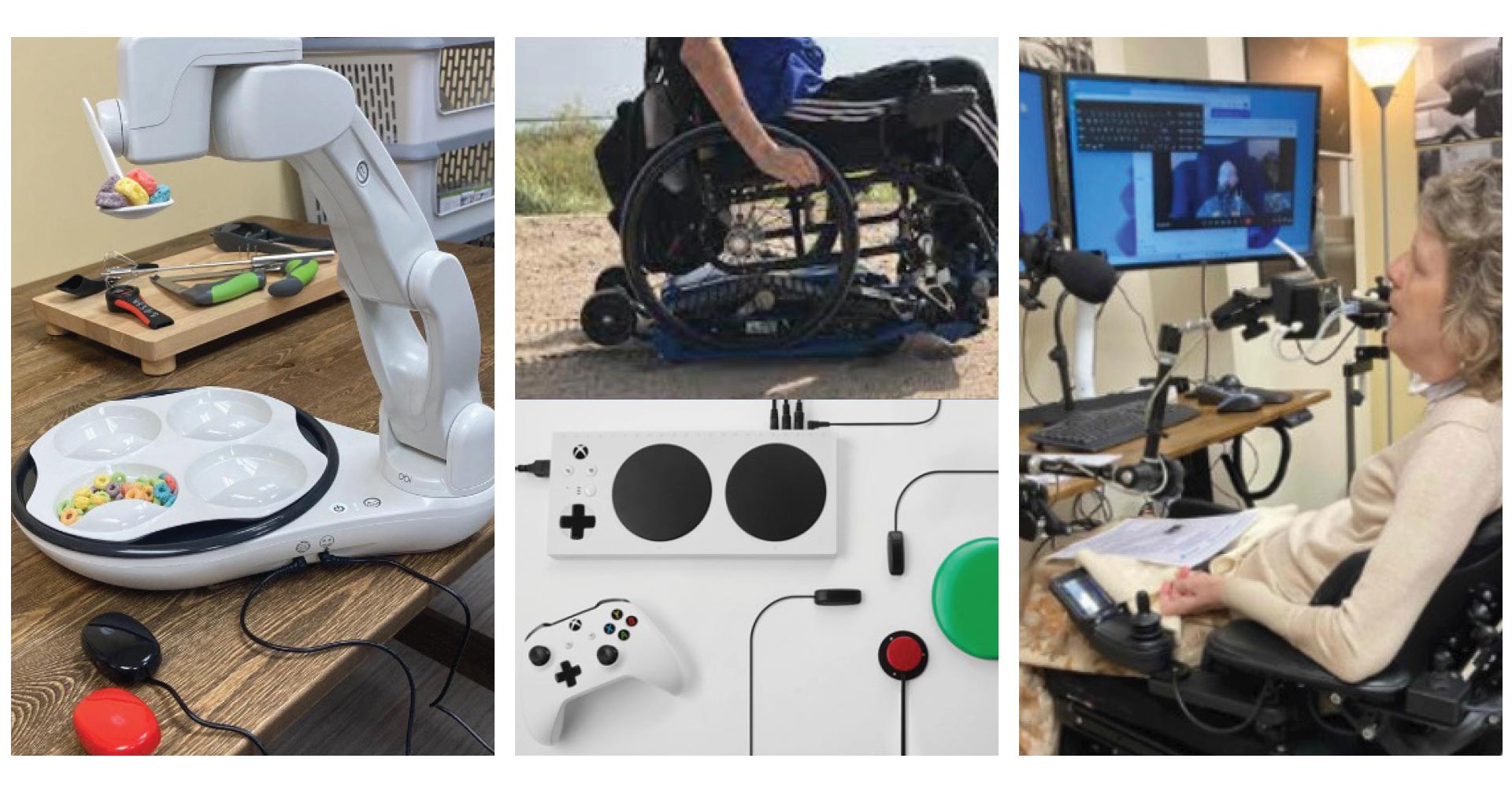A year ago, Blake Perkins, PT, DPT, ATP, a clinical and research physical therapist at the MetroHealth Rehabilitation Institute, was awarded a $200,000 grant through the Craig H. Neilsen Foundation. This grant established the MetroHealth Adaptive Life Technologies (ALT) Lab—which in its first year, connected 55 people living with a spinal cord injury (SCI) with assistive technologies that help improve function and independence throughout their home and greater community.
The ALT Lab gives patients access to a wide variety of technologies to meet clinical goals beyond those typically targeted in traditional rehabilitation—goals like home automation, environmental control, computer access, outdoor mobility and even gaming. While there are a handful of similar labs throughout the country, the ALT Lab is the only one led by others living with SCI. It’s also the one of the few that partners with community organizations to bring these technologies to life in the homes of its recipients.
“The ALT Lab has long been a brainchild of my research mentor, Dr. Anne Bryden. To see this idea come to life is something I take a lot of pride in,” says Dr. Perkins. “Our current focus is on promoting clinically-guided, peer-informed and community-collaborative assistive technologies for individuals living with SCI, though, we intend to make this service available to others with disabilities due to illness or injury in the future.”
- Clinically-guided: As a part of the MetroHealth Department of Physical Medicine and Rehabilitation (PM&R), the ALT Lab works closely with physicians, other therapy team members, researchers and social workers. The lab is also supported by Stephen Polakowski, an information technology expert and business owner, as well as other MetroHealth Rehabilitation Institute collaborators, including Anne Bryden, PhD, OTR/L, James Wilson, DO, and Eric Schearer, PhD.
- Peer-informed: Like Dr. Perkins, Polakowski also lives with SCI. Together, their invaluable lived experience informs their professional expertise. As a result, they not only offer tried-and-true technologies but also novel ones—or novel pairings of technologies—to meet clinical goals.
- Community-collaborative: The ALT Lab partners with the Cleveland State University (CSU) SCI Volunteer Corps to assist in the installation and configuration of select technologies for individuals in need.
The Patient Experience
When a patient is referred to the ALT Lab, the first step is a virtual assessment where Dr. Perkins discusses the types of tasks they may want to improve and their level of importance to the individual. This allows the team to hone in on each patient’s priorities. The tasks may include:
- Returning to work or school
- Opening, shutting, locking doors (and automating home security)
- Controlling in-home climate and lighting
- Alternative controlling of a powered/hospital bed
- Preparing meals and self-feeding
- Accessing the computer and internet
- Being mobile outdoors
- Grooming
- Using a phone or gaming system
For the next visit, the patients come to the ALT Lab to meet with Dr. Perkins and Polakowski, who together design the system and technologies that will be used. During this appointment, the patient can “test drive” the various assistive technologies to determine the best fit and solution to meet their goals. Additionally, they talk with the patient about funding since many of these technologies are not covered by insurance. If the patient doesn’t have funding available, Dr. Perkins connects them with alternative funding sources such as Ohio Medicaid waiver programs and grants.
Once the equipment system is selected, Dr. Perkins and team plan out every single component and work with the patient and/or case manager to get it ordered. When funding is secured and the equipment is delivered, the CSU SCI Volunteer Corps assist in the assembly and installation of the equipment in the patient’s home.
Now in its second year, the ALT Lab hopes to serve 75 patients. It is also working to further equipment manufacturer relationships and ensure financial stability to keep the program moving forward.
“I’ve always been very at home around technology—even more so after my spinal cord injury. Serving the relatively niche patient population here in the ALT Lab really allows me and Steve (Polakowski) to highlight a pretty unique background and skill set. It’s truly a joy to piece together the ‘assistive tech’ puzzle for folks in real time. I’m excited to continue bringing the vision to life,” says Dr. Perkins. “We are helping people feel like more than just a patient—they are becoming employees again, they feel like they can contribute as spouses and parents again, and they can connect to the world again. That’s the hope. We are reminding them thatthey can still lead impactful lives.”
Just like Dr. Perkin.
If interested in learning more about how the ALT Lab can benefit you or someone you know, reach out to Blake Perkins at bperkins@metrohealth.org.











